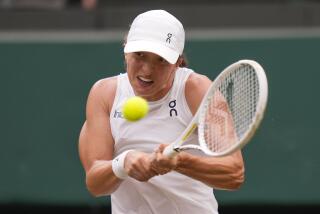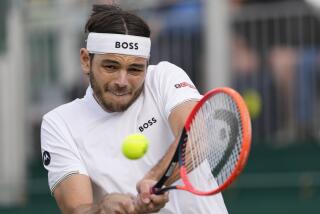Dokic Can Do Without Daddy Dearest
- Share via
NEW YORK — It’s impossible not to feel sorry for Jelena Dokic, whose steeliness in the face of her loutish father’s boorish antics is nothing short of inspiring.
Damir Dokic, whose daughter was a Wimbledon semifinalist this year, is an embarrassment to tennis, an apparently hard-drinking, unsympathetic man who was only too willing to rain a tabloid storm on his 17-year-old daughter’s head last week over the price of a $10 piece of salmon in the players’ lounge at the U.S. Open.
“TENNIS DAD TOSSED,” screamed the front-page headline in the New York Daily News after Dokic was forcibly removed, his tearful daughter in tow, and later barred from the grounds of the National Tennis Center. The Wednesday incident escalated after Dokic directed an obscenity-filled tirade at a food server.
“BOUNCED!” roared the headline in the New York Post.
Dokic, a pot-bellied man with an unkempt beard, is no stranger to controversy.
He attacked a cameraman at the Australian Open this year and was escorted off the grounds by police at Wimbledon after what appeared to be a drunken incident in which he paraded around carrying a flag, made wild pronouncements on a variety of topics and smashed a reporter’s cellular phone.
Last year, he was arrested in Birmingham, England, after lying in the road outside the tennis stadium, ranting about NATO.
His latest antics, which the tournament’s head of security alleged were fueled by alcohol, came only one day after Dokic told the Daily News that he was going to curtail his drinking and improve his behavior.
“I don’t make problems,” he told the newspaper. “Others make problems. If you make something bad to me, I react. But it has to stop. It must stop. It’s no good for Jelena.”
If only her father had kept his word, Jelena could have played her side-court, second-round match Thursday against Miriam Oremans in anonymity instead of in front of a phalanx of whirring cameras and notebook-toting reporters waiting for her to crack.
Her 6-1, 6-4 victory was a study in determination.
After eating lunch with her father in Manhattan--her mother and brother did not accompany them--she calmly dispatched Oremans, sitting impassively under an umbrella between points and seemingly oblivious to the added attention.
“Doesn’t seem to distract me,” said Dokic, who won three more matches at Wimbledon and reached the semifinals after her father was ejected. “That’s what the match today showed.”
Born in Belgrade and now living in Australia, where her father emigrated from Serbia in 1994, Dokic should be attracting notice for her tennis, not her father’s childish behavior. Ranked 43rd, she is a graceful athlete with seemingly limitless potential.
Like Mary Pierce--whose father, Jim, received a lifetime ban from the WTA Tour in 1993 amid his daughter’s allegations of physical and mental abuse--she deserves better.
Even if her father’s abuse is not aimed directly at her, Dokic is ultimately hurt by it and should not have to put up with it.
But Dokic, whose 7-6 (4), 7-5 victory Saturday over Francesca Schiavone of Italy moved her into a round-of-16 matchup against defending champion Serena Williams, has insisted she enjoys her father’s company and needs him as her coach, even as the WTA ponders further action against him.
And her father contends he is the only one who can help her to reach her potential.
“She will never need another coach,” he told the Daily News last week. “ . . . Other coaches, when she loses, they say, ‘Take your time. There is always next year.’ I say, ‘No. You don’t have time. You must go faster, harder. If you stop, it’s over.’ ”
Earth to Damir: She’s 17.
GORAN, GORAN: GONE?
If Goran Ivanisevic is truly pondering retirement, as he seemed to indicate after his first-round loss to Dominik Hrbaty of Slovakia at the U.S. Open, it’s a sad time for men’s tennis.
The colorful Croatian has long been one of the most quotable and entertaining players on the ATP Tour, even if it’s generally conceded that he has never reached his full potential. A three-time Wimbledon finalist, Ivanisevic, 28, has been called the best player to never win a Grand Slam event.
But he was always good for a funny story or biting quote.
The old fire was gone, however, as he fell meekly to Hrbaty, winning only one of the last 19 games in a 3-6, 6-0, 6-1, 6-0 loss.
“No idea how to play,” he said of his listless performance. “No idea what to do. I cannot put first serve in the court. Just walking there like my first year on the tour, lost boy, wild card.”
A “museum match,” he called it. “When you go to a museum, that’s how I played. I don’t know. It’s just happening that I don’t have fun anymore to play. I won the first set, I don’t know how, to be honest. I just didn’t do anything.
“I cannot motivate myself.”
The left-handed Ivanisevic, a first-round loser 10 times this year, is suffering from a torn rotator cuff, the same injury that sidelined Patrick Rafter of Australia for eight months after surgery.
Though his shoulder won’t get better without it, Ivanisevic is reluctant to have the surgery because he believes it might end his career.
“I’m going to do a lot of thinking,” he said. “Then I’m going to decide what to do.
“If I’m going to play at all this year, any match, I have to decide. It’s tough to say ‘yes,’ it’s tough to say ‘no.’ It’s stupid for me to say after the match, ‘I’m not going to play,’ then tomorrow say, ‘I’m going to play.’ ”
Tennis writers everywhere wish him only the best.
LET’S GET READY TO RUMBLE
Serena and Venus Williams, to their credit, reacted with humor to John McEnroe’s challenge in this week’s edition of the New Yorker.
McEnroe, working the U.S. Open as a television commentator, told the magazine that the Williams sisters, while dominant on the women’s tour, could be beaten by a male college player or any man on the senior tour--such as McEnroe.
“I don’t know if I could fit him in my schedule right now,” Venus said of a potential battle-of-the- sexes matchup against McEnroe. “I don’t think it’s fair to put a 20-year-old against a fortysomething person. So, I’ll let that pass.”
Serena, 18, seemed more eager.
“You want a piece of me?” she said, playfully challenging the 41-year-old McEnroe. “Obviously, men are stronger than women. He can throw down if he wants. I don’t know. Who knows? It’s interesting. It would be interesting to see where we stand on that.”
Said top-ranked Martina Hingis, asked why men feel the need to issue challenges to women players: “I could say something. But it’s like kindergarten a little bit.”
More to Read
Go beyond the scoreboard
Get the latest on L.A.'s teams in the daily Sports Report newsletter.
You may occasionally receive promotional content from the Los Angeles Times.










